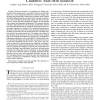75 search results - page 14 / 15 » Lower Bounds for Asynchronous Consensus |
DC
2010
13 years 3 months ago
2010
First-Come-First-Served (FCFS) mutual exclusion (ME) is the problem of ensuring that processes attempting to concurrently access a shared resource do so one by one, in a fair order...
STOC
2003
ACM
14 years 8 months ago
2003
ACM
The problem of cooperatively performing a set of t tasks in a decentralized setting where the computing medium is subject to failures is one of the fundamental problems in distrib...
SPAA
2005
ACM
14 years 1 months ago
2005
ACM
An asynchronous algorithm is described for rapidly constructing an overlay network in a peer-to-peer system where all nodes can in principle communicate with each other directly t...
PODC
2005
ACM
14 years 1 months ago
2005
ACM
We study the distributed complexity of computing a maximal independent set (MIS) in radio networks with completely unknown topology, asynchronous wake-up, and no collision detecti...
CORR
2007
Springer
13 years 8 months ago
2007
Springer
—Resource allocation is investigated for fading relay channels under separate power constraints at the source and relay nodes. As a basic information-theoretic model for fading r...

